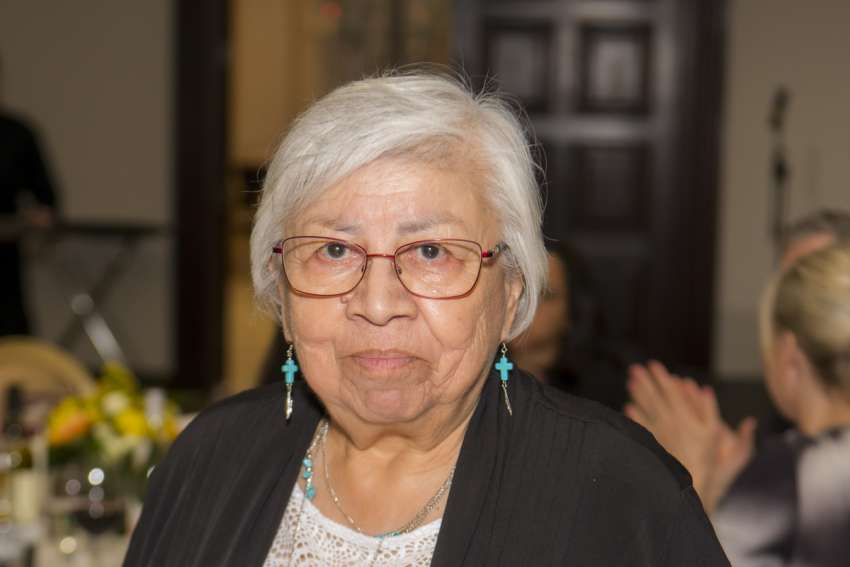Translated literally, “magis” is Latin for “more” or “greater.” It’s a key concept in Jesuit spirituality, based on St. Ignatius of Loyola’s central question — “What more can you do for God?” The initials “AMDG” found on Jesuit churches, schools, even the top right-hand corner of Jesuit exam papers, stands for Ad Maiorem Dei Gloriam, “To the Greater Glory of God.”
In accepting the award, Kinoshameg — Odawa/Ojibway elder, mother of five, grandmother of seven, great-grandmother of three — promised to do more.
“I will continue to not stop in helping others,” she told a ballroom full of Jesuits with their friends and donors, who stood up to applaud her.
Given the many things Kinoshameg has done, what more she might do is difficult to imagine. She is a registered nurse who has had a career promoting and protecting the public health of the Wikwemikong Unceded First Nation on Manitoulin Island. In the 1990s she helped the Jesuits study the near epidemic of diabetes among Indigenous people in northern Ontario.
Her work with the Jesuits on diabetes led to her role as chair of the Wassieandimiikaaning Board of Trustees of the Anishinabe Spiritual Centre at Anderson Lake, north of Manitoulin Island. She was a founding member of the Catholic Aboriginal Council of the Canadian Conference of Catholic Bishops, which later became the Guadalupe Circle. Today, she chairs the Indigenous Healing Fund’s independent, all-Indigenous board, which makes final decisions about how a $30-million fund from Catholic dioceses across Canada will be spent.
Since 2000 Kinoshameg has been a mandated member of the Diocesan Order of Service, a unique form of lay commitment to the Church in the Diocese of Sault Ste. Marie. In 1996, the Jesuit graduate faculty of theology at Regis College awarded her with an Honorary Doctor of Sacred Letters. In 2015 Pope Francis honoured her with the Pro Ecclesia et Pontifice medal for distinguished service to the Church.
When news of the unmarked graves broke in Canada in 2021, Jesuit Provincial Superior Fr. Erik Oland turned to Kinoshameg to understand how this new evidence of suffering at Canada’s residential schools would change the relationship the majority of Canadians have with Indigenous people. Two hours spent listening to Kinoshameg, who made her first communion in a Jesuit-founded residential school in Spanish, Ont., helped Oland to understand the “new step that had been taken in what it means in this country to walk towards reconciliation.”
“I really felt from that time we spent together not only the generosity of Rosella, but also the willingness to share,” Oland told guests at the annual dinner as he bestowed the Magis Award on Kinoshameg.
The Jesuit called Kinoshameg’s capacity for patient listening an example “gifted to the whole Society of Jesus.”
“We together will create a more positive future,” Oland said. “With peace, hope, brotherhood and sisterhood.”


